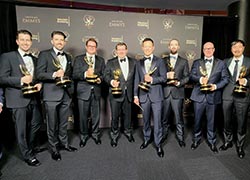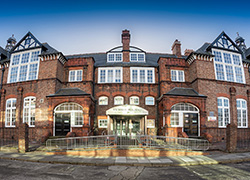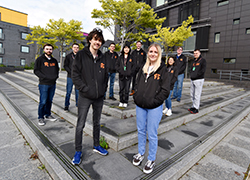Course overview
Accredited Foundation year Work placement
Animex 2024
Animex 2024 round-up, our international festival of animation, VFX and games.
Have you ever looked at your favourite games and thought how they were crafted? Games programmers are the masterminds behind the gameplay elements, graphics, and audio that make games come alive. It's a role that demands an exceptional level of technical skill and creativity.
Throughout your journey, you acquire the essential skills and knowledge to become a proficient games programmer, armed with a deep understanding of the games industry. This knowledge and experience will be your ticket to a rewarding career within the world of games. Beyond the classroom, you'll participate in a range of extracurricular activities, including game jams, hackathons, and networking events with industry professionals.
By the time you complete this course, you'll be equipped to embark on an rewarding career in the games industry, bringing your innovative ideas and technical expertise to the forefront of interactive entertainment.
The course is structured around the following themes:
- programming and agile software engineering practices
- gaming hardware and platforms
- gameplay programming and user interfaces and artificial intelligence
- networked multiplayer games (from social gaming to massively multiplayer games) graphics, animation, physics, and simulation programming.
Top reasons to study this course at Teesside:
- Number 1: Teesside University has been ranked the number 1 video game design and development school in the UK and number 5 in Europe. (GAMEducation 2025, tees.ac.uk/source).
- £2,000 Accommodation Award: you may be eligible for £2,000 towards your accommodation fees if you live outside the TS postcode and are in your first year of study. Find out more.
- British Computer Society (BCS) academic membership: get free BCS membership to accelerate your career path with CV builder tools, e-learning courses, mentorships programmes, jobs boards and volunteering opportunities.
- Industry links: take part in Animex, our annual international animation and games festival featuring experts from Rockstar, Pixar, Disney and Sony.
- Career-ready: our ExpoSeries of events allow you to showcase your skills to industry professionals who are seeking to recruit new and rising talent.
- Start-up business support: we support you to develop your own business in games through our innovative Power UP Indie Games Accelerator.
Course details
Course structure
Year 1 core modules
Learn about the maths, algorithms and data structures that are essential for computer science and computer games – putting first principles into an applied context.
This module is closely linked to our programming modules and prepares you with essential, transferable problem-solving skills.
This is a 30-credit module.
Gain the skills you need for game creation using a contemporary game engine. Understand the fundamentals of modern game development, including scripting, asset creation and level design.
This is a 30-credit module.
Learn how to write computer programs with a focus on games-related applications. You consider common programming constructs that apply to multiple object-oriented programming languages such C++, Java, C#. You then focus on the games industry-standard C++ language.
This is a 30-credit module.
Develop your programming and software engineering skills, knowledge and professionalism. Learn about advanced areas of C++ programming, along with standard analysis and design approaches.
This is a 30-credit module.
Year 2 core modules
You investigate the architectural requirements of a game engine and the advantages and disadvantages of different approaches. Create some of the identified systems such as graphics and simulation, demonstrating their effectiveness through a small game demo.
This is a 30-credit module.
You work with students from across all the games courses to develop a game slice in a team. Experience working in a production environment, and focus on specific skills in your own field of study while gaining valuable teamwork skills.
This is a 30-credit module.
Expand your knowledge and skills in games programming, computer architecture and software development. Focus on developing restricted mobile hardware and multiplayer aspects.
This is a 30-credit module.
You focus on the low-level scripting available in modern game engines. Create your own custom functionality by programming algorithms, functions and classes at an engine level.
This is a 30-credit module.
Optional work placement year
You have the option to spend one year in industry learning and developing your skills. We encourage and support you with applying for a placement, job hunting and networking.
You gain experience favoured by graduate recruiters and develop your technical skillset. You also obtain the transferable skills required in any professional environment, including communication, negotiation, teamwork, leadership, organisation, confidence, self-reliance, problem-solving, being able to work under pressure, and commercial awareness.
Many employers view a placement as a year-long interview, therefore placements are increasingly becoming an essential part of an organisation's pre-selection strategy in their graduate recruitment process. Benefits include:
· improved job prospects
· enhanced employment skills and improved career progression opportunities
· a higher starting salary than your full-time counterparts
· a better degree classification
· a richer CV
· a year's salary before completing your degree
· experience of workplace culture
· the opportunity to design and base your final-year project within a working environment.
If you are unable to secure a work placement with an employer, then you simply continue on a course without the work placement.
Final-year core modules
The use of 3D graphics in computer games has become increasingly realistic, and is one of the most important methods in conveying the game state to the player. You investigate 3D graphics techniques and apply a selection of them to create a portfolio. Research modern 3D programming techniques and libraries, and become familiar with creating code to run on both the central and graphics processing units.
This is a 30-credit module.
Gain an integrated view of artificial intelligence (AI) and its application in computer games, exploring up-to-date and advanced AI techniques.
This is a 30-credit module.
You undertake a large-scale project guided by a member of staff, where you produce a substantial piece of work related to your course alongside a written report. You also present and discuss your project.
This is a 60-credit module.
Modules offered may vary.
How you learn
It is essential for you to gain experience in being a programmer. Your modules use a combination of lecture sessions to study the theory, computer lab sessions to put theory into practice with tutor guidance, and controlled studio environments to practice your professional and teamwork skills.
In your second year you take part in our unique Journeyman module, highly praised by industry, in which all games art students work with games designers in a simulated game studio experience, outsourcing various essentials such as assets and animation to specialist teams. You work on games in Unreal and Unity to strict milestones in a scenario that is as close to industry practice as possible within an academic environment.
Learn using our industry-standard facilities including multiple games development labs, virtual reality lab, and state-of-art Vicon motion capture facilities.
How you are assessed
Our course focuses on the application of the knowledge and skills you acquire. Most of your modules require you to design and develop software to demonstrate your new abilities. Your assignments are set by your tutor and you work on them throughout the academic year whilst receiving valuable feedback to guide your work.
Our Disability Services team provide an inclusive and empowering learning environment and have specialist staff to support disabled students access any additional tailored resources needed. If you have a specific learning difficulty, mental health condition, autism, sensory impairment, chronic health condition or any other disability please contact a Disability Services as early as possible.
Find out more about our disability services
Find out more about financial support
Find out more about our course related costs
Entry requirements
Entry requirements
96-112 points and either maths GCSE grade 4, Level 2 Key Skills (Application of Number) or Level 2 Functional Skills. We also accept alternative equivalent or higher level qualifications.
Find out how many points your qualifications are worth using the UCAS tariff calculator. If your qualifications are not listed, contact our admissions team as we may accept alternatives.
We may also be able to help you meet the entry requirements through our Summer and Winter University modules.
For general information please see our overview of entry requirements.
International applicants can find out what qualifications they need by visiting Your Country.
You can gain considerable knowledge from work, volunteering and life. Under recognition of prior learning (RPL) you may be awarded credit for this which can be credited towards the course you want to study.
Find out more about RPL
Employability
Career opportunities
You are ideally suited for employment in the games development industry and similar creative industries. A variety of programming roles exist within these industries such as gameplay programmer, tools programmer, middleware developer and mobile application programmer. The course gives you a strong foundation in computer programming, also allowing for a career in mainstream software development.
Our graduates are highly sought after in the games industry securing roles in AAA studios across the country and the globe including Accenture, HMRC, Zerolight, Ubisoft, Creative Assembly, Double 11, Microsoft, Traveller's Tales and many more.
Information for international applicants
Qualifications
International applicants - find out what qualifications you need by selecting your country below.
Select your country:
Useful information
Visit our international pages for useful information for non-UK students and applicants.


 BSc (Hons) Computer Games Programming
BSc (Hons) Computer Games Programming BSc (Hons) Computer Games Programming
BSc (Hons) Computer Games Programming Emmy success for Teesside University graduate
Emmy success for Teesside University graduate Indie games studios to attend prestigious conference
Indie games studios to attend prestigious conference Leading games studio helping students gain industry experience
Leading games studio helping students gain industry experience